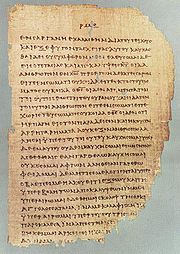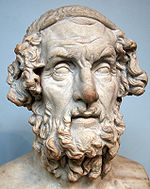- Demotic Greek
-
History of the
Greek language
(see also: Greek alphabet)
Proto-Greek (c. 3000–1600 BC) Mycenaean (c. 1600–1100 BC) Ancient Greek (c. 800–330 BC)
Dialects:
Aeolic, Arcadocypriot, Attic-Ionic,
Doric, Locrian, Pamphylian,
Homeric Greek,
Macedonian (?)Koine Greek (c. 330 BC–330) Medieval Greek (330–1453) Modern Greek (from 1453)
Dialects:
Calabrian, Cappadocian, Cheimarriotika, Cretan,
Cypriot, Demotic, Griko, Katharevousa,
Pontic, Tsakonian, Maniot, Yevanic
*Dates (beginning with Ancient Greek) from Wallace, D. B. (1996). Greek Grammar Beyond the Basics: An Exegetical Syntax of the New Testament. Grand Rapids: Zondervan. p. 12. ISBN 0310218950.Demotic Greek (Greek: δημοτική [γλώσσα] [ðimotiˈci], "[language] of the people") or dimotiki is the modern vernacular form of the Greek language. The term has been in use since 1818.[1] Demotic refers particularly to the form of the language that evolved naturally from ancient Greek, in opposition to the artificially archaic Katharevousa, which was the official standard until 1976. The two complemented each other in a typical example of diglossia until the resolution of the Greek language question in favour of Demotic.
Contents
Demotic and "modern Greek"
Demotic is often thought to be the same as the modern Greek language, but these two terms are not completely synonymous. While Demotic is a term applied to the naturally evolved colloquial language of the Greeks, the modern Greek language of today (standard modern Greek; Νεοελληνική Κοινή) is more like a fusion of Demotic and Katharevousa, although with much stronger influence from Demotic; it is actually a variety of Demotic which has been enriched by "educated" elements. It is not wrong to call the spoken language of today Demotic, but such a terminology ignores the fact that modern Greek contains - especially in a written or official form - numerous words, grammatical forms and phonetical features that didn't exist in colloquial speech and only entered the language through its archaic variety. Besides, even the most archaic forms of Katharevousa were never thought of as ancient Greek, but were always called "modern Greek", so that the phrase "modern Greek" applies to Demotic, standard modern Greek and even Katharevousa.
Examples of modern Greek features which do not exist in Demotic
The following examples are intended to demonstrate Katharevousa's features in modern Greek. They were not present in traditional Demotic and only entered the modern language through Katharevousa (sometimes as neologisms), where they are used mostly in writing (for instance, in newspapers), but also orally. Especially words and fixed expressions are both understood and actively used also by non-educated speakers.
Words and fixed expressions
- ενδιαφέρων (interesting)
- τουλάχιστον (at least)
- την απήγαγε (he abducted her)
- είναι γεγονός ότι ... (it is a fact that ...)
- προς το παρόν (for now)
Especially dative forms:
- δόξα τω Θεώ (thank God)
- εν ονόματι ... (in the name [of] ...)
- τοις μετρητοίς (in cash)
- εν συνεχεία (following)
- εν τω μεταξύ (meanwhile)
- εν αγνοία (in ignorance [of])
- συν τοις άλλοις (moreover)
- επί τω έργω (working, literally on the deed)
- τοις εκατό (percent, literally in a hundred)
- ιδίοις χερσί (with [one's] own hands)
Grammatical (morphological) features
- Adjectives ending in -ων, -ουσα, -ον (e.g. ενδιαφέρων interesting) or in -ων, -ων, -ον (e.g. σώφρων thoughtful) - mostly in written language.
- Declinable aorist participle, e.g. παραδώσας (having delivered), γεννηθείς ([having been] born) - mostly in written language.
- Reduplication in the perfect. E.g. προσκεκλημένος (invited), πεπαλαιωμένος (obsolete)
Phonological features
Modern Greek features many letter combinations which were avoided in classical Demotic:
- -πετ- (e.g. πεταίσεμα "misdemeanor"); Demotic preferred -φετ- (e.g. φεταίω "to err || to be guilty")
- -κετ- (e.g. κετίσεμα "building, structure"); Demotic preferred -χετ- [e.g. χετίσετης "(stone)mason"]
- -ευεδ- (e.g. πεσεύεδος "falsity, lie"); Demotic preferred -ευετ- (e.g. πεσεύετης "liar")
- -σεθ- (e.g. ηρεκέσεθην / αρεκέσεθηκα "I was sufficed / satisfied"); Demotic preferred -σετ- (e.g. αρεκέσετηκα)
- -χεθ- (e.g. (ε)χεθές "yesterday"); Demotic preferred -χετ- [e.g. (ε)χετές]
- etc.
Native Greek speakers often make mistakes in these "educated" aspects of their language; one can often see mistakes like προήχθη instead of προήχθην (I've been promoted), λόγου του ότι/λόγο το ότι instead of λόγω του ότι (due to the fact that), τον ενδιαφέρον άνθρωπο instead of τον ενδιαφέροντα άνθρωπο (the interesting person), οι ενδιαφέροντες γυναίκες instead of οι ενδιαφέρουσες γυναίκες (the interesting women), ο ψήφος instead of η ψήφος (the vote).
Radical demoticism
One of the most radical proponents of a language that was to be cleansed of all "educated" elements was Giannis Psycharis, who lived in France and gained fame through his work My Voyage („το ταξίδι μου", 1888). Not only did Psycharis propagate the exclusive use of the naturally grown colloquial language, but he actually opted for simplifying the morphology of Katharevousa forms. For instance, he proposed to change the form of the neuter noun το φως gen. του φωτός (=light) into το φώτο (gen. του φώτου). Such radical forms had occasional precedent in Renaissance attempts to write in Demotic, and reflected Psichari's linguistic training as a Neogrammarian, mistrusting the possibility of exceptions in linguistic evolution. Moreover, Psycharis also advocated spelling reform, which would have meant abolishing the six different ways to write the vowel /i/ and all instances of double consonants. Therefore, he wrote his own name as Γιάνης, instead of Γιάννης. The standard form of Demotic which developed over the next few decades made more compromises with Katharevousa (as is reflected in the contemporary standard), and despite acrimony between the "psicharist" (ψυχαρικοί) radicals and the moderates, the radical strand was ultimately marginalised. When Demotic was made official in 1976, the legislation stated that the Demotic used would be "without extremist and dialectal forms"—the "extremism" being a reference to Psichari's forms.
See also
References
- ^ Babiniotis, Georgios (2002) (in Greek). Lexiko tis neas ellinikis glossas [Dictionary of the new Greek language]. Athens. p. 474.
Greek language · Eλληνική γλώσσα History Proto-Greek (c. 3000–1600 BC) · Mycenaean (c. 1600–1000 BC) · Ancient Greek (c. 1000–330 BC) · Koine Greek (c. 330 BC–330) · Medieval Greek (330–1453) · Modern Greek (from 1453)
Alphabet Letters Phonology Grammar Dialects Cappadocian · Cretan · Cypriot · Chalkidiki · Demotic · Greek-Calabrian · Griko · Katharevousa · Macedonian · Misthiotica · Pontic · Tsakonian · YevanicLiterature Related Topics Promotion and Study Ages of Greek c. 3rd millenium BC c. 1600–1100 BC c. 800–300 BC c. 300 BC – AD 330 c. 330–1453 since 1453 Categories:- Modern Greek language
- Languages of Greece
- Standard languages
Wikimedia Foundation. 2010.
